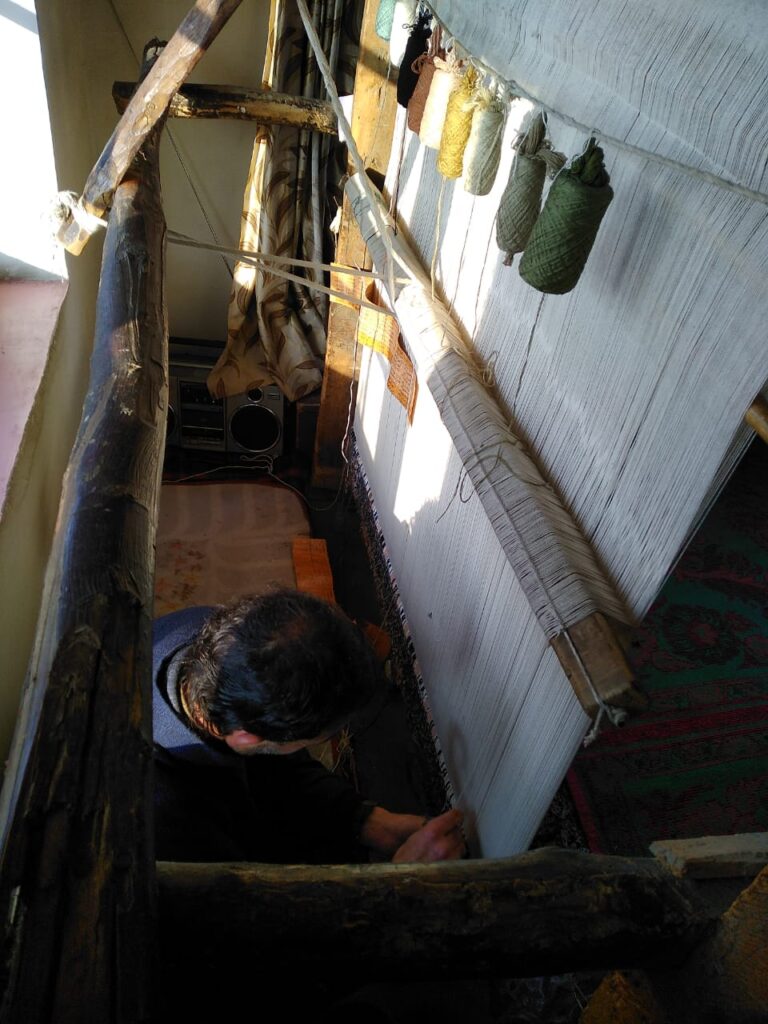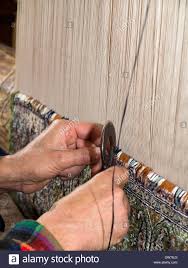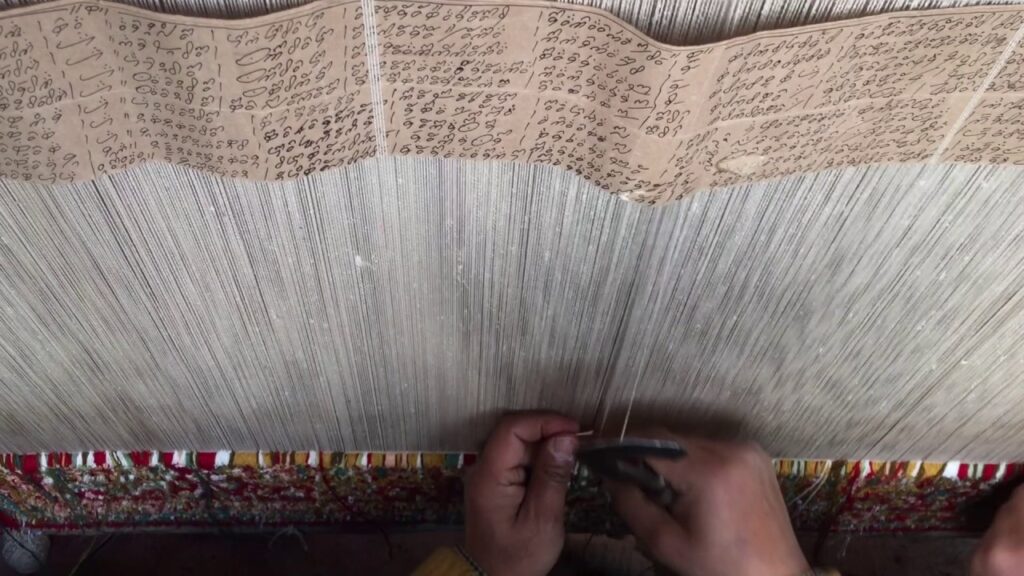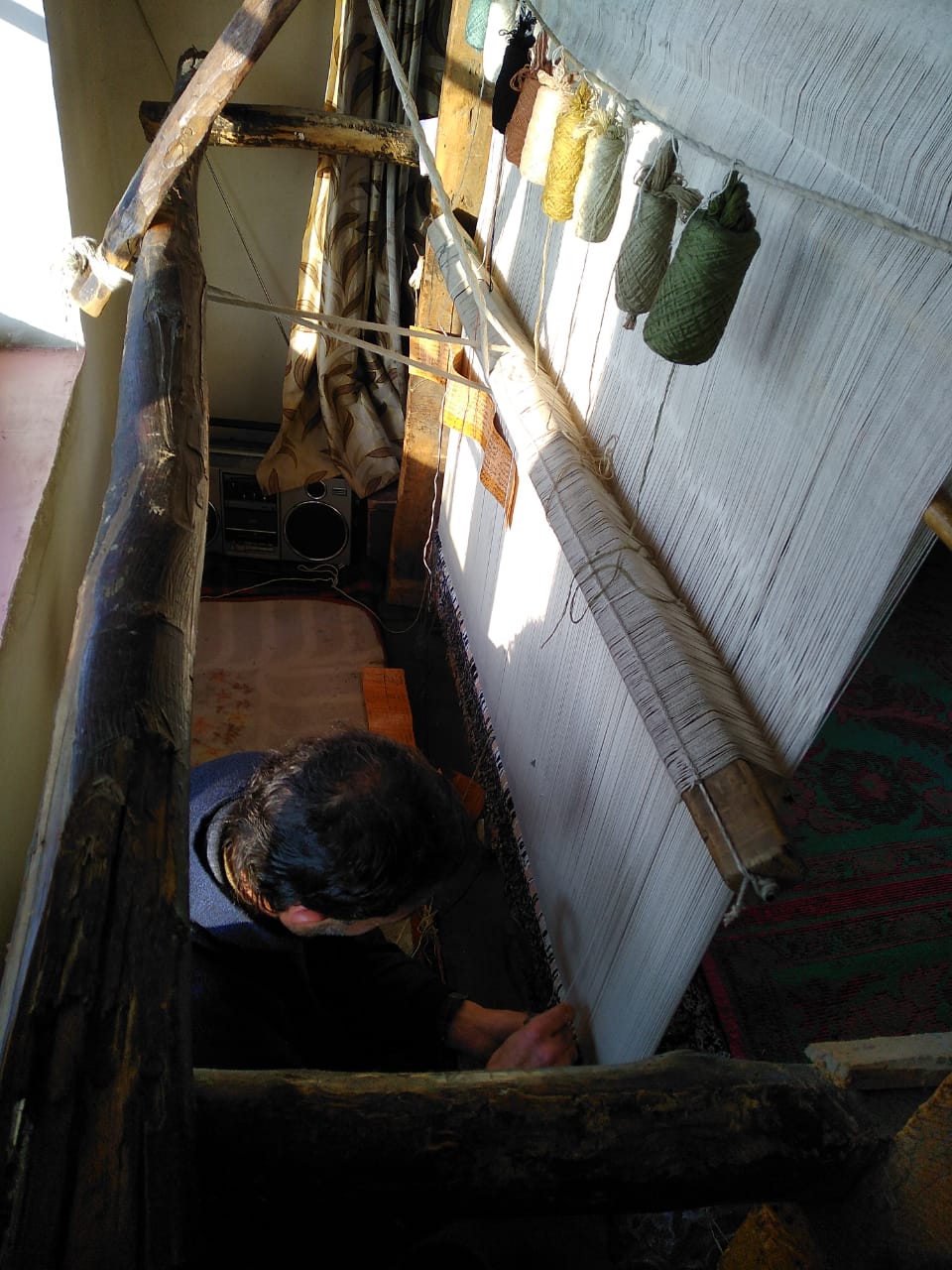In the past, carpet weaving (Qaleen Baafi) in Kashmir was one of the primary professions to earn a livelihood. With time, this craft is losing its sheen as nowadays there are fewer takers of this profession.
By: Syed Mustafa Ahmad
Carpet Weaving (Qaleen Baafi), from Yarqand, was a flourishing business in the past. It was a gift from those who helped to spread Islam in Kashmir. The book “Kashmir Under the Sultans” written by Mohibbul Hassan tells that Sultan Zain-Ul-Abideen, who ruled from 1420-1470, brought different kinds of professions and craft skills from Central Asia. Badshah ( Zain-Ul-Abideen) had good contacts with outside countries like Iran, Afghanistan, Iraq, etc. Today, we often listen about the Silk Route. The modern CPEC between China and Pakistan is a small replica of that grand route. It was the route that brought Islam and handicrafts to Kashmir. This route also took Buddhism from Nepal to China.

Abdul Gani Sheikh from Ladakh mentioned the route in a text book for 11th class Urdu (JK BOSE). Zain-Ul-Abideen was influenced by the traditions of his ancestors, like Sultan Shihab-Ud-Din and Sultan Sikandar. Sayyid Mir Ali Hamdani and his son Mir Muhammad Hamdani brought different professions with them to be self-independent. Sayyid Hamdani had written a book about the economic system in Islam that left a profound influence over people.
Moreover, they were aware of the physiography and the culture of Jammu and Kashmir. In that way, it helped the native people of Kashmir much. It contributed about 9,000 crores to the state exchequer. It was a remedy for unemployment and a perennial profession or occupation that provided a livelihood to those who could not go to school because of poverty or other reasons like Adil. It was a privilege for some to be engaged in this profession with fascinating things like the warp and weft, knife, beating comb, shears, the silk of different colours, etc. A lot of stories are associated with this business. Adil is one of them. It is full of nostalgia. Adil and his family were happy that they had a carpet loom at their home. Adil was the third child among five. His two elder brothers were illiterate and hence labourers. His sister was Anganwadi helper and the youngest brother was working as a porter in a defence camp. Adil’s ancestors were famous for learning, particularly in Persian and Arabic. But Adil and his siblings were not so lucky in gaining any useful knowledge.

Agriculture was and is the primary source of income at Adil’s village. His father and his elder brothers were busy in agricultural work while Adil took to Qaleen Baafi after being compelled to abandon his studies. In the 1980s, some so-called rich of the village brought Carpet Weaving to the village. Those days, it was a craze to be in this occupation. They considered it right as it would bring monetary benefits to the village, and they would not remain idle at different places like Margs and Charaaes (Meadows and grazing fields), Wudars ( Karewas), etc. But something else was destined for the people of this village. The village, being illiterate, had some hope of literacy when in the 1980s, some students like Adil began to go to the local primary school. They were happy as there were a lot of innovative things to do. Books were windows for them to look at different things and places. They felt pity over those who were busy in child labour, but they didn’t know that their misery was more horrible than theirs was waiting for them.
According to Adil, he was compelled to throw away his uniform and books. He understood it crystal clear that the liberty of getting an education was going to get snatched. He wept to his might, but his father, being a hardcore person, did not feel pity over him. He was told to go to learn Kasb (Skill) to live his life with ease.

It was not a surprising thing for him because, at that time, poverty was common. There was the same building for schools and caret loom so there was a minor shift of a room, but that was a bigger distance from education to illiteracy. There was a new world in front of the students in classrooms, while in another room, there were tight strings that would hurt the tiny and tender fingers. In classrooms, a teacher would give some time to rest, but there was a lunch break of just 25 minutes in the carpet loom. As student, there was hope for a bright future and to take a long flight of freedom, but the wings of their desires were clipped before the dreams come true. After that day, Adil would wake up to prepare himself for carpet weaving instead of school. Instead of pencil and copy, he had to take iron and wooden tools with him. He was looking at them minutely but could not differentiate because of his young age. The former things provided freedom, but no money, while the latter gave money but no freedom. Caught in this situation, Adil accepted his mother’s advice and, with brimming tears, left for the same building but with a lot of differences. The rhyming sounds from the adjacent classroom would lure him. He yearned to be among them. His heart longed to enjoy those illustrated books. However, something different was in store for him.
Years passed and Adil continued the carpet profession. Working under different teachers, he finally installed a loom at his home under the tutelage of the teacher from the Downtown area. Those days, downtown was the hub of this craft.
However, the hard work came to a sudden end due to the introduction of power looms, and the government’s ignorance towards this craft added the irony. He, along with his teachers, could not keep pace with the mechanized-world. Today, Adil hates to work on the loom. He doesn’t expect the craft to guarantee him a good life as he has two daughters and is living separately. So he wants government intervention.
He is hopeful that the government’s intervention towards this industry can revive it. But most of the people associated with this craft are hopeless as they haven’t seen any appreciable step from the government to save the decades old carpet weaving industry. So now a day, leastpeople are interested in taking up this profession. They say that there is no fun in being engaged in such a career which earns only miseries! I have seen Adil fighting with his wife over this profession. Yes, his wife was right in saying that you would better find some alternative if you could not afford to meet life’s necessities.

Leave a Reply